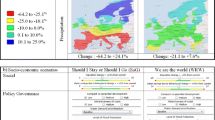Abstract
Within the CLEAR project a new approach to integrated assessment modelling has been developed for the participatory integrated assessment of regional climate change involving citizens' focus groups. The climate change decision problem was structured by focusing separately on climate impacts and mitigation options. The attempt was made to link the different scales of the problem from the individual to the global level. The abstract topic of climate change was related to options on the level of a citizen's individual lifestyle. The option of a low energy society was emphasised in order to embed the climate change decision problem in a wider range of societal concerns. Special emphasis was given to the characterisation and communication of uncertainties. The chosen approach allows different kinds of uncertainties in one framework to be addressed. The paper concludes with a summary of the experience made, and recommendations for the use of models in participatory integrated assessments.
Similar content being viewed by others
References
J. Alcamo, ed., IMAGE 2.0: Integrated Modeling of Global Climate Change (Kluwer Academic, Dodrecht, 1994).
H. Dowlatabadi, Integrated Climate Assessment Model 2.0, technical documentation, Department of Engineering and Public Policy, Carnegie-Mellon University, Pittsburgh (1995).
J. Rotmans and B. De Vries, eds., Perspectives on Global Change: The TARGETS Approach (Cambridge University Press, Cambridge, 1997).
G. Morgan and H. Dowlatabadi, Learning from integrated assessment of climate change, Climatic Change 34 (1996) 337–368.
J. Jaeger, Current thinking on using scientific findings in environmental policy making, Environmental Modelling and Assessment 3 (1998) 143–153.
U. Dahinden, C. Querol, J. Jäger and M. Nilsson, Using Computer Models in Participatory Integrated Assessment – Experiences Dathered in the ULYSSES Project and Recommendations for Further Steps, ULYSSESWorking Paper, WP-99-2, EAWAG, Dübendorf (April 1999) (in review).
C. Schlumpf, C. Pahl-Wostl, A. Schönborn, C.C. Jaeger and D. Imboden, IMPACTS: An information tool for citizens to asess impacts of climate change from a regional perspective, in review.
M. Munasinghe, P. Meier, M. Hoel, S.W. Hong and A. Aaheim, Applicability of techniques of cost-benefit analysis to climate change, in: Climate Change 1995: Economic and Social Dimensions of Climate Change. Contribution of Working Group III to the Second Assessment Report of the IPCC, eds. ∼[Jaeger, 1998 #22], J.G.J.J.P. Bruce, H. Lee and E.F. Haites (Cambridge University Press, Cambridge, 1996) pp. 145–178.
C. Schlumpf, J. Behringer, G. Dürrenberger and C. Pahl, The personal CO2 calculator: A modeling tool for participatory integrated assessment methods, Environmental Modeling and Assessment 4 (1999).
G. Dürrenberger, J. Behringer, U. Dahinden, A. Gerger, B. Kasemir, C. Querol, R. Schüle, D. Tabara, F. Toth, M. van Asselt, D. Vassilarou and W.N., Focus Groups in Integrated Assessment: A Manual for a Participatory Research, ULYSSES Working Paper, WP-97-2, Center for Interdisciplinary Studies in Technology, Darmstadt University of Technology, Darmstadt (1997).
C.C. Jaeger, R. Schüle and B. Kasemir, Focus groups in integrated assessment: A micro-cosmos for reflexive modernization, innovation – The European Journal of Social Sciences 3 (1999).
C. Pahl-Wostl, M. van Asselt, C. Jaeger, S. Rayner, C. Schaer, D. Imboden and A. Vckovski, Integrated assessment of climate change and the problem of indeterminacy, in: Views from the Alps: Regional Perspectives on Climate Change, eds. P. Cebon, U. Dahinden, H. Davies, D. Imboden and C. Jaeger (The MIT Press, Cambridge, Massachusetts, 1998) pp. 435–498.
J.J. Houghton, L.G. Meiro Filho, B.A. Callander, N. Harris, A. Kattenberg and K. Maskell, eds., Climate Change 1995 – The Science of Climate Change (Cambridge University Press, 1996).
J.P. van der Sluijs, Anchoring Amid Uncertainty; On the Management of Uncertainties in Risk Assessment of Anthropogenic Climate Change (CIP-Gegevens Koniklijke Bibliotheek, Den Haag, Utrecht, 1997).
C. Frei, C. Schär, D. Lüthi and H.C. Davies, Heavy precipitation processes in a warmer climate, Geophys. Res. Lett. 25 (1998) 1431–1434.
S. Shackley and B. Wynne, Global climate change: The mutual construction of an emergent science-policy domain, Science and Public Policy 22 (1995) 218–230.
C. Pahl-Wostl, The transition to a low-energy society: An evolutionary growth model, in review.
B. Kasemir, U. Dahinden, Å. Gerger, R. Schüle, D. Tabara and C.C. Jaeger, Fear, Hope and Ambiguity: Citizens Perspectives on Climate Change and Energy Use, ULYSSES Working Paper, WP-99-1, in review.
S.J. DeCanio, Economic modeling and the false tradeoff between environmental protection and economic growth, Contemporary Economic Policy 15 (1997) 10–27.
R.J. Barro and X. Sala-Martin, Economic Growth (McGraw-Hill, New York, 1995).
H. Rogner, Hydrogen technologies and the technology learning curve, International J. Hydrogen Energy 23(9) (1998) 833–840.
P. Checkland, Model Validation in Soft Systems Practice, Systems Research 12 (1995) 47–54.
Author information
Authors and Affiliations
Rights and permissions
About this article
Cite this article
Pahl-Wostl, C., Schlumpf, C., Büssenschütt, M. et al. Models at the interface between science and society: impacts and options. Integrated Assessment 1, 267–280 (2000). https://doi.org/10.1023/A:1018927120883
Issue Date:
DOI: https://doi.org/10.1023/A:1018927120883




